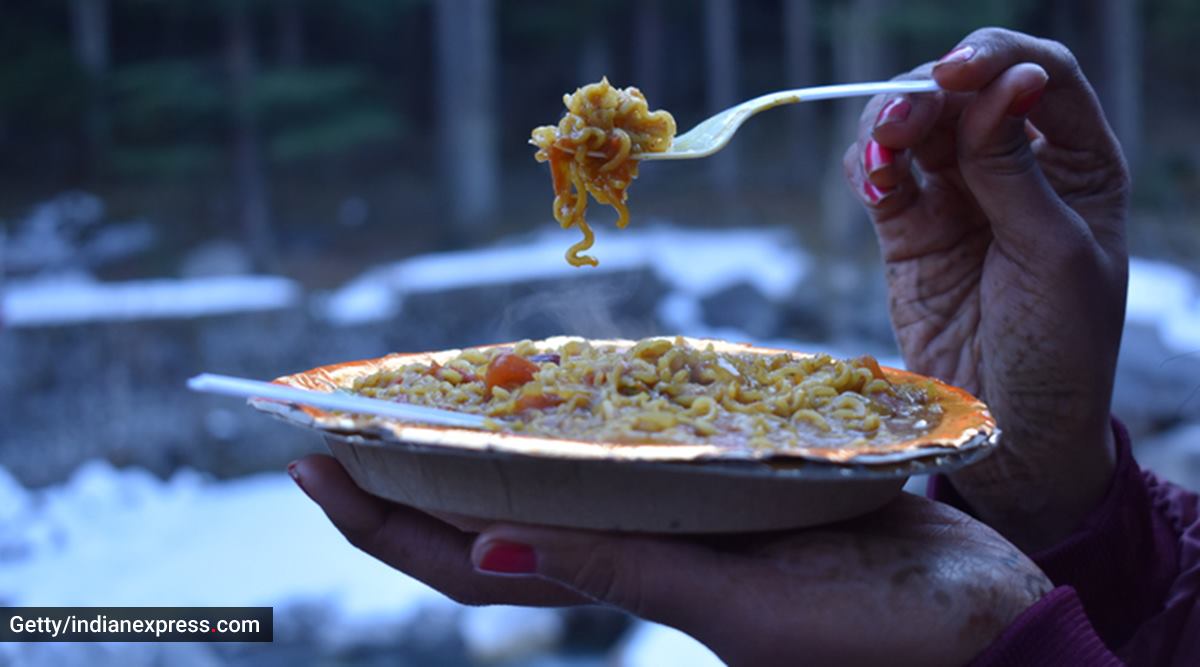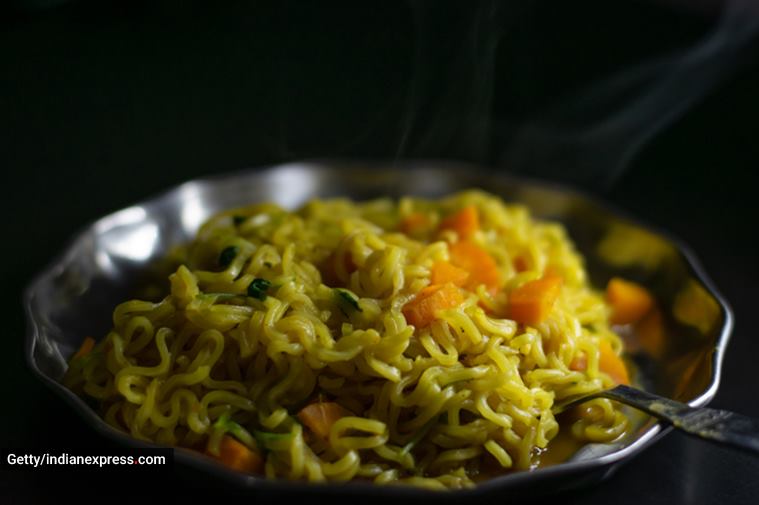 Call it a childhood sentiment or a grown-up obsession, the love for Maggi is truly unconditional. (Photo: Getty/Thinkstock)
Call it a childhood sentiment or a grown-up obsession, the love for Maggi is truly unconditional. (Photo: Getty/Thinkstock) Maggi is not a food, it is nostalgia. It is evocative of childhood. Of the time when a dollop of cold Maggi would fall on your friend’s lunchbox during the 20-minute school lunch break. Or when you would fight with your sibling for the last scoop, while also convincing your mother to make more of it for dinner, and even breakfast.
Growing up, we have had a bitter-sweet relationship with the food. While we can all agree that thandi Maggi is a bigger turn-off than a potential love interest letting out a burp on the first date, it is also a survival food — ice-cold or garma-garam.
Regardless of whether you grew up millennial or Gen-Z, the yellow coloured noodle always found a way into your house… and also your heart. It claims to be a two-minute preparation, which does not need a lot of paraphernalia and ingredients.
In the pandemic, especially, its worth has increased manifold, with people living away from families turning to it for comfort and for a semblance of calm in all the pandemic chaos.
For Ankit Berry, 30, a media professional who finds himself travelling between Delhi and Kolkata, Maggi is the ultimate love. He tells indianexpress.com that the masala (the spicy yellow-coloured powder packed neatly inside a shiny-silvery sachet) is “next level”. “While oats Maggi is my current favourite, the original Maggi is awesome. It has to be ‘Maggi day’ at least once a week, and with cheese in it, it is like dessert.”
In the pandemic, Ankit says he has had Maggi every week.
Ditto for Tamil Nadu-based student Tara Rajendran (27), who says she likes Maggi for its “flavourful, delicious” taste, and the fact that it “requires no expertise to cook” and is “ubiquitous”. “I have had it countless times in the pandemic,” she says.
While Ankit likes myriad Maggi combinations — from “plain Maggi, to dhaba Maggi, hills-waali Maggi, cheese and Maggi and Maggi sandwich” — for Tara, “spicy Maggi and egg Maggi with bell pepper” do the trick.
For V Padmini, a 29-year-old Chennai resident, who works in the private sector and lives with a flatmate, Maggi has been a go-to food in the pandemic. She makes sure she has it every week, at least once, preferably with vegetables. “I usually eat it when I feel too lazy to cook, or when there is a craving. Sometimes, I don’t even make an effort to chop veggies and add it to my Maggi; I eat it plain.”
In Pune, Maitri Jain (29), a software developer, associates Maggi with her childhood. As a kid, she would crave everything new that would arrive in the market, and Maggi soon became a favourite for her and her sister. “When I moved to the hostel for my graduation, it became a saviour. When the lockdown was announced last year, Maggi was something we ordered in bulk. But now, we have it only once or twice a month,” she shares.
Sankalp, an 18-year-old Delhi-based student lives with his family. He says while he is not that big a fan of Maggi, he eats it because it is “easily available in the market”. “I eat it when I don’t find anything else to fill my stomach with. I do not like it bland, so I add some spices and veggies to enhance its taste.”
 How do you like your Maggi, with veggies or plain? (Photo: Getty/Thinkstock)
How do you like your Maggi, with veggies or plain? (Photo: Getty/Thinkstock)
Is Maggi healthy?
Sometime last month, Nestle, the manufacturer of Maggi noodles, had acknowledged in an internal document that more than 60 per cent of its mainstream food and drink products do not meet a “recognised definition of health”, and that some of the categories and products will “never be healthy” no matter how much they “renovate”.
In fact, the food company came under the scanner when Financial Times reported on its internal document findings. Following that, Nestle made a statement that it is working on a “company-wide project” to update its nutrition and health strategy, looking at its entire portfolio to make sure its products helped “meet people’s nutritional needs”.
Despite this information, Maggi loyalists say it is difficult to completely give up on the food.
“I was clear that Maggi is unhealthy. I was aware of the increased lead content and the 2015 infamous Maggi ban. Yet, during hostel life, at 2 am, we resorted to Maggi as a quick help. While my love [for the food] will not change, it is high time I re-evaluate Maggi consumption,” says Tara.
Ankit is of the opinion that Maggi is to be eaten for its taste, “not for health”. “And once a while, an indulgence is stress-relieving.”
Padmini says that though she is unaware of exactly what “proportion of Maggi” is unhealthy, she is aware that it was never exactly a healthy food option, to begin with. “I call it ‘leisure food’. But considering that Nestle has acknowledged some of its food items are unhealthy, it calls for Maggi lovers to at least reduce the frequency of consumption.”
According to Maitri, one cannot completely “avoid” processed food, and Sankalp says he does not care much, for he doesn’t eat Maggi every day.
Weird Maggi combinations
Despite cautionary updates, the love for Maggi has only grown exponentially across the country. While Nestle India remained unavailable for a comment when this story went online, a report in Business Standard — dated June 5, 2020 — states Nestle sold some 2,64,000 mt of Maggi products in 2019, compared to 2,54,500 mt in 2014. In fact, the growth in sales of the Maggi brand of products in 2019 surpassed the pre-ban level of 2014, in terms of both volume and value, per the report.
The testimony of the food item’s soaring popularity also lies in the weird food combinations that surfaced online around the same time that Dalgona coffee made waves a few weeks into the pandemic.
View this post on Instagram
View this post on Instagram
View this post on Instagram
There was the blasphemous chocolate Maggi, which was followed by the sacrilegious Maggi and curd combination. Indians also innovated with Oreo Maggi (*gags*) and Maggi laddoos and pani puris (*faints*).
Call it a childhood sentiment or a grown-up obsession, the love for Maggi is truly unconditional, for it is what has kept it buoyant for many years, and will continue to do so in the future, too — pandemic and after.
For more lifestyle news, follow us: Twitter: lifestyle_ie | Facebook: IE Lifestyle | Instagram: ie_lifestyle
- The Indian Express website has been rated GREEN for its credibility and trustworthiness by Newsguard, a global service that rates news sources for their journalistic standards.

